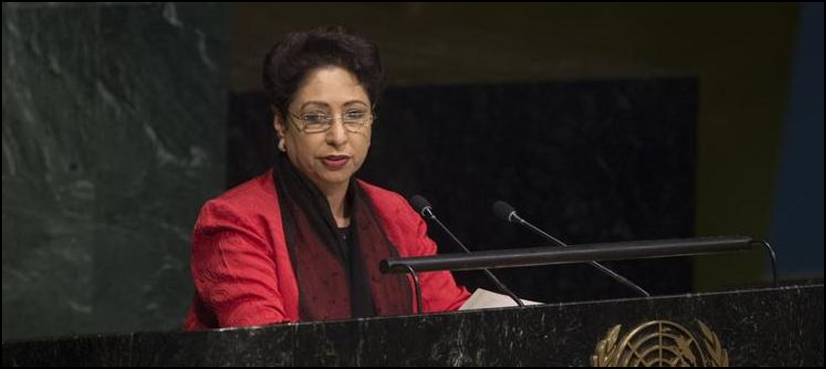
NEW YORK: Pakistan has highlighted middle-income countries’ leading role in achieving Sustainable Development Goals (SDGs), particularly those related to poverty, and called for helping them attain long-term debt sustainability and financial inclusion.
“Middle-Income countries contribute almost half of the global GDP (Gross Domestic Product), but they are also home to 73% of the world’s poor,” Ambassador Maleeha Lodhi told the UN General Assembly which held a high-level meeting on gaps and impediments faced by middle-income countries in the implementation of the 2030 Agenda for Sustainable Development.
Speaking in the debate, the Pakistani envoy urged the United Nations and all other stakeholders to focus attention on middle-income countries, which have large concentration of the poor population, for achievement of SDGs.
Though middle-income countries face common challenges, she said, they differ in the extent of poverty, natural resource endowment, development potential and economic and social performance.
“There is therefore no ‘one-size-fits-all’ approach to development,” Ambassador Lodhi said, adding that development assistance by the United Nations development system should respond to the varying development needs of host countries.
Also, she said that Official Development Assistance (ODA) would continue to be an important for the delivery of the 2030 Agenda, and underscored the need to assist developing countries in attaining long-term debt sustainability and financial inclusion.
But as it currently stands, ODA’s scope and size, relative to the GDP of middle-income Countries, was limited, affording only limited capacity to expand their fiscal space, the Pakistani envoy said.
Pakistan, she said, looked forward to the High-level UN Conference on South-South Cooperation to commemorate the 40th anniversary of the Buenos Aires Plan of Action (BAPA) to be held in Argentina in March next year.
Describing the China-Pakistan Economic Corridor (CPEC) as a “shining example” of South-South cooperation, Ambassador Lodhi said its benefits were not restricted to participating countries, but would include the region and beyond.
“In addition to South-South cooperation, triangular cooperation, which allows traditional donors and other partners to join South-South initiatives are also important,” she said, calling it an additional means of leveraging resources and building linkages through capacity-building initiatives.
Ambassador Lodhi said that Pakistan regarded South-South cooperation as a complement to, and not a substitute for, North-South cooperation, and urged the UN development system to continue its efforts to mainstream support to South-South cooperation and triangular cooperation.
Opening the meeting, General Assembly President María Fernanda Espinosa Garcés said middle-income countries are a growing economic force substantially contributing to the global gross domestic product (GDP). Sheltering 70 per cent of the world’s population, those countries will not achieve the 2030 Agenda unless obstacles the face are duly addressed, she said.
Gaps in inequality and financing must be eliminated, the 193-member Assembly’s president stressed.
Prime Minster of Antigua and Barbuda Gaston Alphonso Browne challenged models of development shaped by wealthy States.
“It is in the best interest of humanity that we work collectively in building a transformational model of cooperation for sustainable global development,” PM Browne. Questioning the validity of modalities used to assess development levels, he said his small, vulnerable country is disqualified from access to concessional loans and grants due to “skewed constructs of what represents development”.
People in middle-income countries are being punished for their adherence to human and political rights and the openness of their economies to foreign investment, the prime minister said. Small groups of expatriates receive most of the profits from those investments, while arbitrary rules imposed by a handful of rich countries make economic diversification difficult.
Fair trade, access to finance, anti competition rules and debt burden should be among the factors used to measure development as opposed to simply using per capita income, he said, warning that middle-income countries will witness economic decline and social dislocation if the way they are assessed does not change.
The post Pakistan calls for assisting middle-income countries achieve debt sustainability appeared first on ARYNEWS.
from Pakistan – ARYNEWS https://ift.tt/2EgxarR
